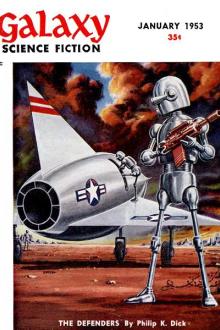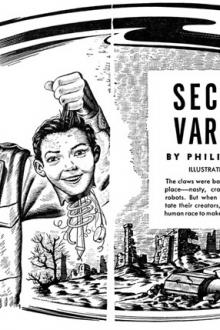Short Fiction Philip K. Dick (primary phonics books .txt) 📖

- Author: Philip K. Dick
Book online «Short Fiction Philip K. Dick (primary phonics books .txt) 📖». Author Philip K. Dick
He saw the skull.
Suddenly he put the gun down. He picked up the skull. He turned the skull over. He looked at the teeth. Then he went to the mirror.
He held the skull up, looking in the mirror. He pressed the skull against his cheek. Beside his own face the grinning skull leered back at him, beside his skull, against his living flesh.
He bared his teeth. And he knew.
It was his own skull that he held. He was the one who would die. He was the Founder.
After a time he put the skull down. For a few minutes he stood at the controls, playing with them idly. He could hear the sound of motors outside, the muffled noise of men. Should he go back to the present, where the Speaker waited? He could escape, of course—
Escape?
He turned toward the skull. There it was, his skull, yellow with age. Escape? Escape, when he had held it in his own hands?
What did it matter if he put it off a month, a year, ten years, even fifty? Time was nothing. He had sipped chocolate with a girl born a hundred and fifty years before his time. Escape? For a little while, perhaps.
But he could not really escape, no more so than anyone else had ever escaped, or ever would.
Only, he had held it in his hands, his own bones, his own death’s-head.
They had not.
He went out the door and across the field, empty handed. There were a lot of them standing around, gathered together, waiting. They expected a good fight; they knew he had something. They had heard about the incident at the fountain.
And there were plenty of police—police with guns and tear gas, creeping across the hills and ridges, between the trees, closer and closer. It was an old story, in this century.
One of the men tossed something at him. It fell in the snow by his feet, and he looked down. It was a rock. He smiled.
“Come on!” one of them called. “Don’t you have any bombs?”
“Throw a bomb! You with the beard! Throw a bomb!”
“Let ’em have it!”
“Toss a few A-Bombs!”
They began to laugh. He smiled. He put his hands to his hips. They suddenly turned silent, seeing that he was going to speak.
“I’m sorry,” he said simply. “I don’t have any bombs. You’re mistaken.”
There was a flurry of murmuring.
“I have a gun,” he went on. “A very good one. Made by science even more advanced than your own. But I’m not going to use that, either.”
They were puzzled.
“Why not?” someone called. At the edge of the group an older woman was watching. He felt a sudden shock. He had seen her before. Where?
He remembered. The day at the library. As he had turned the corner he had seen her. She had noticed him and been astounded. At the time, he did not understand why.
Conger grinned. So he would escape death, the man who right now was voluntarily accepting it. They were laughing, laughing at a man who had a gun but didn’t use it. But by a strange twist of science he would appear again, a few months later, after his bones had been buried under the floor of a jail.
And so, in a fashion, he would escape death. He would die, but then, after a period of months, he would live again, briefly, for an afternoon.
An afternoon. Yet long enough for them to see him, to understand that he was still alive. To know that somehow he had returned to life.
And then, finally, he would appear once more, after two hundred years had passed. Two centuries later.
He would be born again, born, as a matter of fact, in a small trading village on Mars. He would grow up, learning to hunt and trade—
A police car came on the edge of the field and stopped. The people retreated a little. Conger raised his hands.
“I have an odd paradox for you,” he said. “Those who take lives will lose their own. Those who kill, will die. But he who gives his own life away will live again!”
They laughed, faintly, nervously. The police were coming out, walking toward him. He smiled. He had said everything he intended to say. It was a good little paradox he had coined. They would puzzle over it, remember it.
Smiling, Conger awaited a death foreordained.
The DefendersNo weapon has ever been frightful enough to put a stop to war—perhaps because we never before had any that fought for themselves!
Taylor sat back in his chair reading the morning newspaper. The warm kitchen and the smell of coffee blended with the comfort of not having to go to work. This was his Rest Period, the first for a long time, and he was glad of it. He folded the second section back, sighing with contentment.
“What is it?” Mary said, from the stove.
“They pasted Moscow again last night.” Taylor nodded his head in approval. “Gave it a real pounding. One of those R-H bombs. It’s about time.”
He nodded again, feeling the full comfort of the kitchen, the presence of his plump, attractive wife, the breakfast dishes and coffee. This was relaxation. And the war news was good, good and satisfying. He could feel a justifiable glow at the news, a sense of pride and personal accomplishment. After all, he was an integral part of the war program, not just another factory worker lugging a cart of scrap, but a technician, one of those who designed and planned the nerve-trunk of the war.
“It says they have the new subs almost perfected. Wait until they get those going.” He smacked his lips with anticipation. “When they start shelling from underwater, the Soviets are sure going to be surprised.”
“They’re doing a wonderful job,” Mary agreed vaguely. “Do you know what we saw today? Our team is getting a leady to show to the school children. I saw the leady, but only for a moment. It’s good for the children to see what





Comments (0)